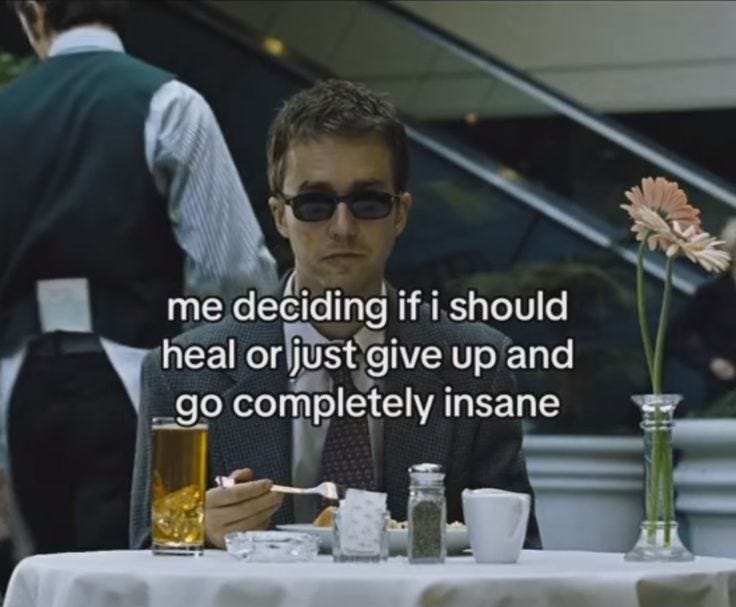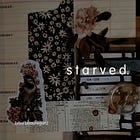Teenagers suddenly aspire to be the next Tate, toddlers come home from daycare with misogynistic attitudes, life-long Democrats fall for unhinged MAGA conspiracies, people overconsume with complete disregard for the environment.
Why is everybody turning into a raging monster?
I remember in secondary school when we were taught both Thomas Hobbes and Jean-Jacques Rousseau, and we had to choose a side for a debate. At the time I was torn: are humans born good or are we born bad?1 That was the gist of it, and a tough question to ask a fifteen-year-old. On the one hand, how nice would it be to see the glass half full and say that we are all inherently good and that it’s society that turns us into monsters. But deep down, already showing pessimistic tendencies, I wanted to side with Hobbes's vision of humans as naturally competitive and violent. Society is what kept us tame, and laws were the reason we did not run wild committing the most abusive acts.
As I observe the world's apparent descent into fascism, the rise of extreme misogyny in online and offline spaces, the indifference towards abusive and violent acts against individuals (especially those belonging to minorities), Thomas Hobbes looks to be the winner of the old human nature debate. As society breaks down, our brutish nature is revealed. Are we turning into monsters, or were we monsters all along, waiting to be unleashed?
Lifelong liberals, grounded and logical people, hard workers, so many are falling for unhinged conspiracy theories. In her book Quiet Damage, Jesselyn Cook shares the stories of people who lost themselves to the online spaces of QAnon and other wild conspiracies. They lost friends, families, communities, sometimes their jobs, all because they believed - and preached - the made-up conspiracies of extremists. Online spaces and social media can quickly ruin lives by their influencing powers. No one is ever immune to propaganda, especially in an age of heightened social isolation.
Social media also easily drives teenage boys into the rabbit holes of manosphere content, exposing them to extreme misogynistic views. Netflix's Adolescence exposed the dangers of constantly engaging with such content, with devastating consequences. But it's not just teenagers who are being fed these dangerous values. Parents are reporting similar attitudes from their toddlers who just started daycare, who come home saying things like “mommy you can’t do this, you’re a girl!” I do remember in school when men (and boys) wearing pink or purple shirts were being made fun of. Misogyny is not a new prejudice, but its extreme version is spreading like wildfire thanks to social media. And people are becoming less shameful about proudly voicing their own bigotry publicly.
The insults, the anger, the inappropriate comments, the rage. They're not limited to social media anymore. Everyone now has a story of people acting rude in public, yelling at them or someone else, having a meltdown, or worse. Main character syndrome is a little too real, and people have forgotten they're not interacting through screens. People have forgotten they're interacting with other people.
My mom's friend has spent 30 years in sales, in the kitchen and bathroom remodeling industry. This year she's retiring early because she's can't take people's attitudes anymore. They're not just rude and disrespectful: they're angry and abusive. She sells faucets and goes home crying. She has noticed this change in the last couple of years, so much so that she'd rather face an uncertain retirement than continue working in customer service.
Customer service has never been an easy job (I have worked in that field for many years) but the change in attitudes seems to spread everywhere. Teachers are sharing the nightmarish stories they experience in the classrooms today, with kids barely able to hold a pencil, and turning violent at a moment's notice. Neighbors are stalking each other, or literally poisoning each other over making too much noise. While violence and abuse have always existed, the casual use of it has skyrocketed. Many have reported a rise in prejudice and hate speech: in Canada, racist remarks against the Indian community is soaring, while tolerance towards the LGBTQ+ is plummeting in secondary schools. In the recent US elections, the shift towards the right, especially in young people, could be taken as a clear sign that safeguarding rights is no longer a primary issue.
Taken as a whole, attitudes of tolerance and civility have surely taken a hit.
I have also felt the pull of the Hobbesian way of life. After you watch people cut the line at the grocery stores ten times, you start to think, maybe I should also start cutting the line. When you see influencers in their mansions, going on trips, buying designer bags, while you struggle to pay the bills working your full-time job, you start to think not fair. Maybe the thought of scamming people has crossed your mind after AI has rejected you from hundreds of job applications.
It feels like being a morally good person yields no rewards, while the morally corrupt face little to no consequences. The government cuts aid, communities have eroded, and everyone is left fending for themselves. Everybody is trying to be the winner of capitalism instead of fighting the very system that leaves them in a cycle of debt and social isolation. It’s so easy to fall into the trap of if everybody is doing it, I will too. Despair breeds more despair, and now everybody and their mom is a fucking cunt.
In the end though, I picked Jean-Jacques Rousseau for my side of the debate. As a teenager pondering the woes of the world, and the pains of her own little life, I still decided that humans were inherently good. I’m sure I talked about people helping each other even in the catastrophic situations, like war and climate disasters. I watched a lot of news, even back then. But I also talked about that one time where the guy that kept bullying me in gym class for years came up to me on a random afternoon and apologized. His apology felt sincere, and he never said anything mean to me ever again. That obviously meant a lot to my teenage self.
Today, I still feel hope when I read about men who became incels but turned their lives around when they realised everything they were consuming was utter nonsense. Same thing for people who fell for those unhinged QAnon conspiracies. Women are getting themselves out of debt and beating their shopping addictions once they've realised just how useless overconsumption truly is. Propaganda is powerful, but we’re not forever helpless in the face of it.
Sometimes people do good things, sometimes people do bad things. Mostly we just want to be together, have a laugh, eat good food and drink good wine. It would be much simpler if things were much simpler. Western societies have always been designed for individual gains to the detriment of the collective good. Poverty is a design, not a flaw. Even colonizing Europeans captured by indigenous societies strived to get back to their captors2. Hundreds of years later, we're still desperately searching for the quiet life we so casually destroyed. So perhaps Rousseau is right: society corrupts. The more we work and can't afford things, the more they invent apps we don't need, the more we invent norms that don't make any sense, the more we watch our neighbours fall into despair; it chips away at our humanity. We could have been headed towards a world of abundance for everyone, but instead we are collectively struggling. And that's why everybody is a fucking cunt:)
fin.
bree beauregard
thanks for being here. you can also find me on TikTok and Instagram. if you can’t become a paid subscriber right now but would like to support my work, you can buy me a coffee (:
reading list
The Quiet Damage: QAnon and the Destruction of the American Family by Jesselyn Cook
The Dawn of Everything: A New History of Humanity by David Graeber & David Wengrow
Discours sur l'origine et les fondements de l'inégalité parmi les hommes by Jean-Jacques Rousseau
Leviathan by Thomas Hobbes
other essays you might enjoy:
For the purpose of this essay, I will stick with these very bare bones Rousseau & Hobbes debates that we were taught in school, though I know this is not exactly correct. However, this is not an essay intended to debate the philosophical nitty gritty of Hobbes or Rousseau.
From The Dawn of Everything: A New History of Humanity. Reports of captivity in tribes during the colonization of the Americas vary, but a truth has emerged: most captured Europeans had praised the virtues of their captors' way of life, some even escaping back to indigenous communities to live out the rest of their lives. Even those who came from landed wealth in Europe have expressed living a better life in American tribes: more personal freedom, more ease and comfort, and no poverty (for anyone). Indigenous leaders were openly sharing their disgust of the European love of money and property, and were "particularly offended by their lack of generosity to one another."










I genuinely think the harder you make it for people to live comfortably, the more ruthless they end up becoming. If money/a job is difficult to get, you become all the more obsessed with getting it. And then it's just a vicious cycle.
I work with children and they make me firmly believe we are all born good. It's the world that corrupts us, I think. Of course there's always the exceptions that prove the rule, but even then I think many (if not all) cases can be attributed to some form of mental sickness.